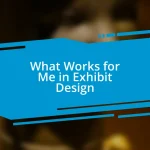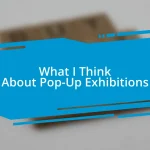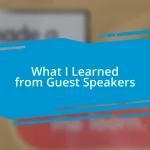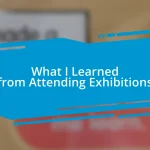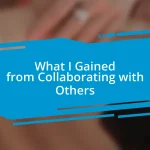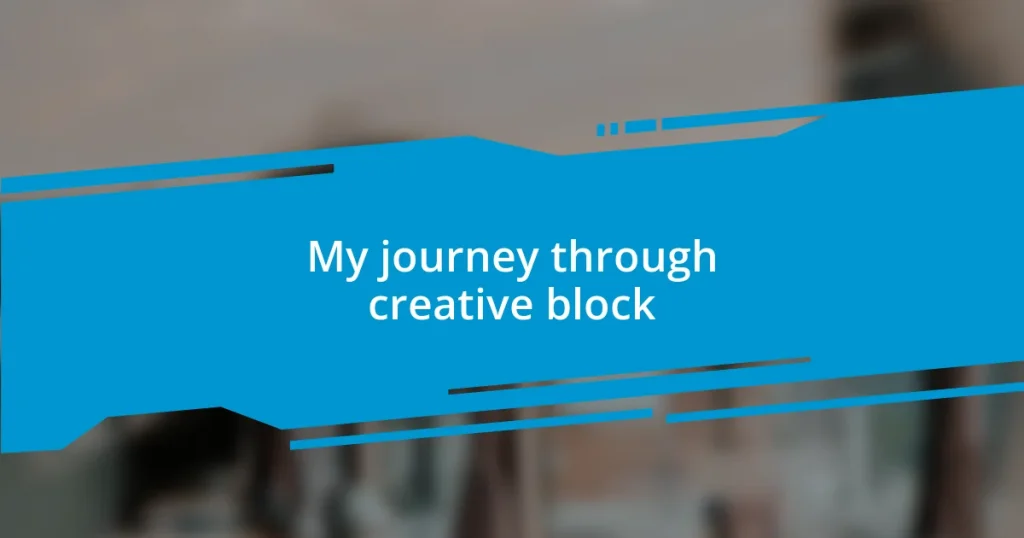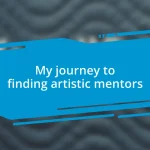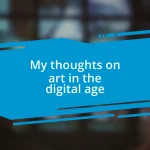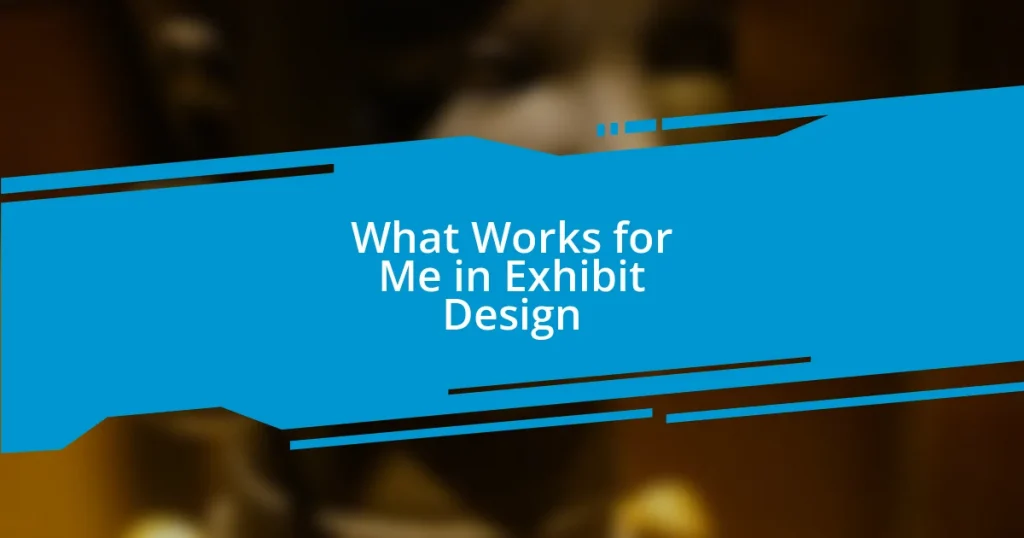Key takeaways:
- Creative blocks often arise from pressure, emotional states, and repetitive routines, making it crucial to recognize their symptoms, such as disconnection, self-doubt, and restlessness.
- Effective techniques to overcome creative blocks include changing the environment, setting small goals, and engaging in free creative exercises like doodling or journaling.
- Building long-term creative habits, such as consistent routines and accountability groups, fosters a steady flow of inspiration and encourages experimentation without fear of failure.
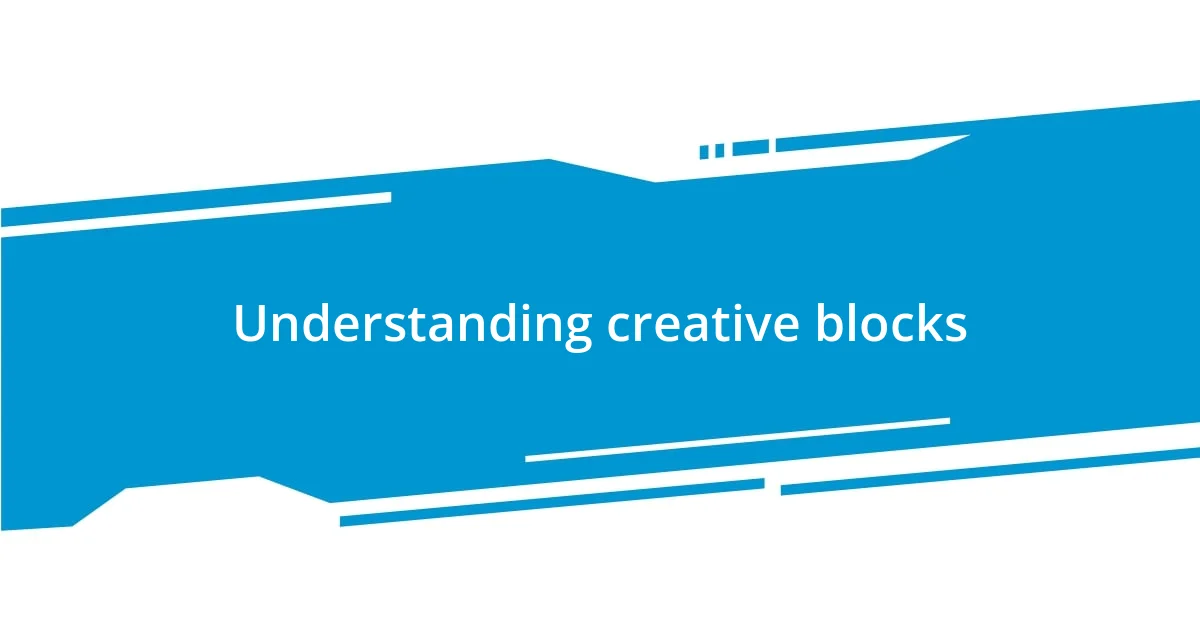
Understanding creative blocks
Creative blocks can feel like an insurmountable wall, standing between you and your ideas. I remember a time when I sat in front of a blank canvas, frustration bubbling up as I wondered why my thoughts had deserted me. It’s puzzling, isn’t it? Why can inspiration be whisked away in an instant, leaving only silence?
At times, I’ve realized that these blocks stem from pressure—self-imposed expectations or deadlines can stifle the creative flow. I vividly recall a week where I had a looming project, and instead of unlocking my creativity, I became paralyzed by the thought of imperfection. How many of you have felt that weight? The irony is that this very weight can drive us deeper into creative stagnation.
I’ve also observed that emotional states heavily influence our creativity. When I’ve been sad or overwhelmed, it’s as if that part of me that conjures ideas retreats to safety. Embracing these feelings, rather than pushing them away, has often helped me return to a more creative mindset. Have you ever noticed how acknowledging your emotions can shift your perspective on a creative block? It’s all part of understanding the ebb and flow of creativity.
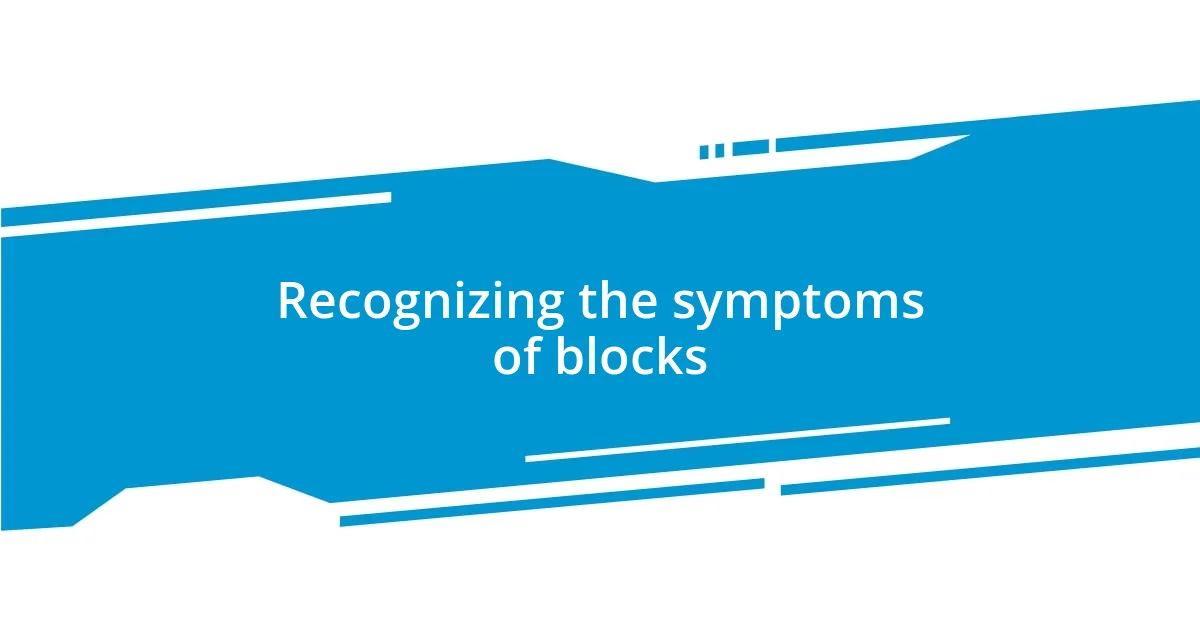
Recognizing the symptoms of blocks
Recognizing the symptoms of a creative block can be like reading between the lines of a silent book. Sometimes, I find myself staring at my workspace, and instead of feeling inspired, I experience a heavy sense of disconnection. It becomes glaringly clear when my mind races through ideas yet fails to land on any single thought worth pursuing. Have you ever felt that daze where creativity seems foggy, leaving you stranded in your own thoughts?
Another common symptom is the recurring feeling of self-doubt. I remember sitting down to write, only for my mind to fill with questions: “Is this good enough? Will anyone care?” Such doubts cloud my creative judgment and prevent me from flowing freely. It’s a reminder that recognizing these feelings is the first step toward overcoming them. In moments like these, I often take a deep breath and remind myself that every creator has been there, grappling with the same doubts.
Physically, creative blocks can manifest as restlessness or fatigue. I recall times when I couldn’t sit still, yet the ideas wouldn’t come. It’s almost ironic how, in the moments we want to create the most, our bodies can feel like jail cells. Acknowledging these physical signs, I’ve learned to be kinder to myself and allow for breaks, which can create space for inspiration to return.
| Symptoms | Examples |
|---|---|
| Disconnection | Staring blankly at a workspace without inspiration |
| Self-doubt | Questioning the value of your ideas and abilities |
| Restlessness | Feeling physically unable to focus while ideas elude you |
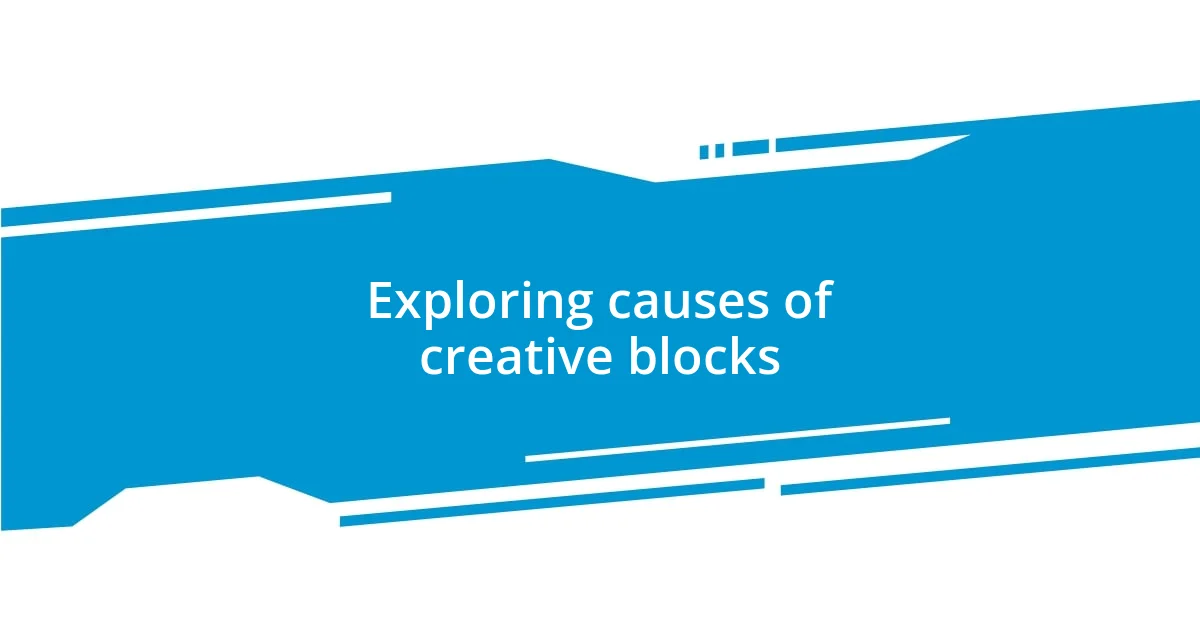
Exploring causes of creative blocks
I often find that creative blocks pop up from a combination of external and internal pressures. For example, when I’m feeling overwhelmed by life’s demands, it becomes impossible to tap into that imaginative flow. I distinctly remember grappling with an unyielding block during a hectic period at work; my usual sources of inspiration felt completely off-limits. Instead of flowing with my creativity, I ended up mentally stacking tasks and priorities, which only served to deepen my sense of frustration.
Here are a few common causes of creative blocks:
- External Pressure: Tight deadlines or excessive expectations can weigh down creativity.
- Perfectionism: The desire for everything to be “just right” can hinder progress.
- Emotional Overload: Stress or sadness can cloud our creative thinking.
- Burnout: Constantly pushing yourself without breaks can drain creative energy.
- Fear of Failure: Worrying about not meeting personal or external standards can stifle creativity.
Shifting gears from personal experience, I’ve discovered that even something as simple as routine can trigger a creative standstill. In my own journey, the days I follow the same schedule tend to stifle innovation. I remember a particularly uninspired week where I woke up, worked, and went to bed without deviation. My creativity felt boxed in, almost like being stuck on a treadmill. Thus, changing my environment or altering my daily habits has often reignited my spark for creativity and allowed fresh ideas to flow again.
In summary, recognizing the layers behind creative blocks is vital in addressing them effectively. Understanding these causes empowers me—and can empower you—to find strategies to move past them.
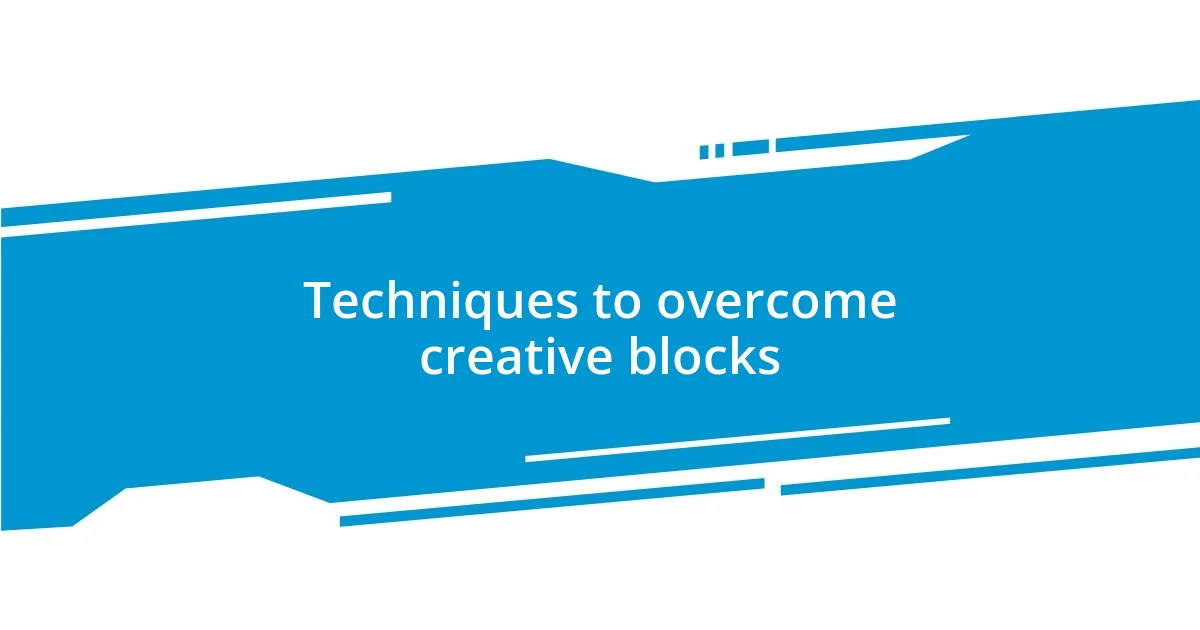
Techniques to overcome creative blocks
To overcome creative blocks, one technique I find effective is changing my environment. There have been times when simply moving to a different room or staring at a blank wall ignited a surge of ideas. Why does this work? It’s all about breaking the monotony; a fresh setting often sparks inspiration in unexpected ways. Have you ever noticed how a walk outside can lead to a flood of new thoughts?
Another method I rely on is setting small, achievable goals. During a particularly challenging Creative rut, I started with just one sentence a day, and to my surprise, those sentences evolved. This step-by-step approach felt less daunting and allowed my creativity to slowly unfold without the crippling weight of perfectionism. Isn’t it fascinating how small movements can lead to big breakthroughs?
Lastly, I often turn to creativity exercises, like free writing or doodling. One afternoon, feeling particularly blocked, I grabbed a sketchbook and let my hand wander without any aim. Those imperfect sketches were surprisingly liberating and opened a door to ideas I hadn’t considered before. It’s all about embracing the process without placing judgment; after all, who says that initial messy creations can’t evolve into something beautiful?
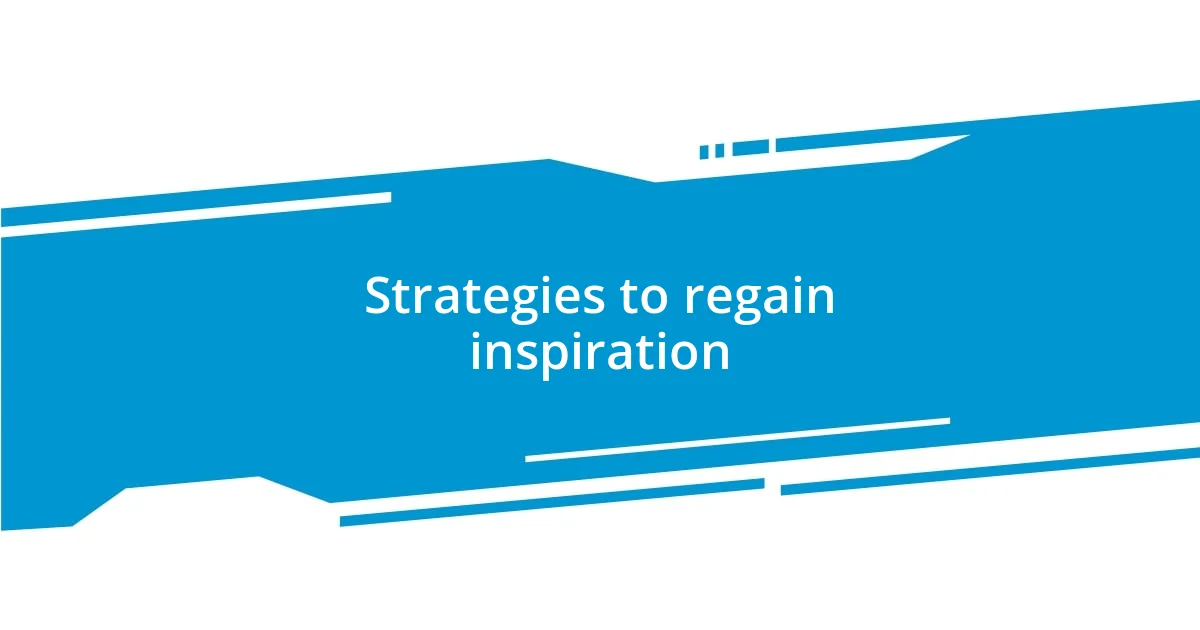
Strategies to regain inspiration
When I hit a wall creatively, one strategy I often turn to is immersing myself in nature. A few years back, I felt completely uninspired, stuck in the same four walls. So, I took myself on a spontaneous hike. The fresh air, the rustle of leaves, and the natural beauty around me felt rejuvenating. It’s incredible how nature can bring about clarity and spark new ideas, isn’t it? Sometimes, the world outside our routine is just what we need to reignite that creative flame.
Another method that works wonders for me is embracing a new hobby. A couple of months ago, I decided to pick up pottery, even though I had zero experience. The initial chaos of clay slipping through my fingers and the unpredictability of my creations invited a sense of freedom I craved. Engaging in something entirely different can shift your mindset and unleash unexpected creativity. Have you tried picking up a passion outside your primary work? It could lead to surprising insights!
Lastly, I frequently practice reflection through journaling. I remember one particularly blocked night, where I poured my thoughts onto the page without any filter. The act of writing down my struggles created a cathartic moment that cleared my mental clutter. It’s a simple yet powerful way to understand what’s holding you back. By tackling those internal barriers head-on, I often discover nuggets of inspiration I didn’t realize were buried within me. Have you ever felt lighter after putting your thoughts into words? It’s a game-changer!
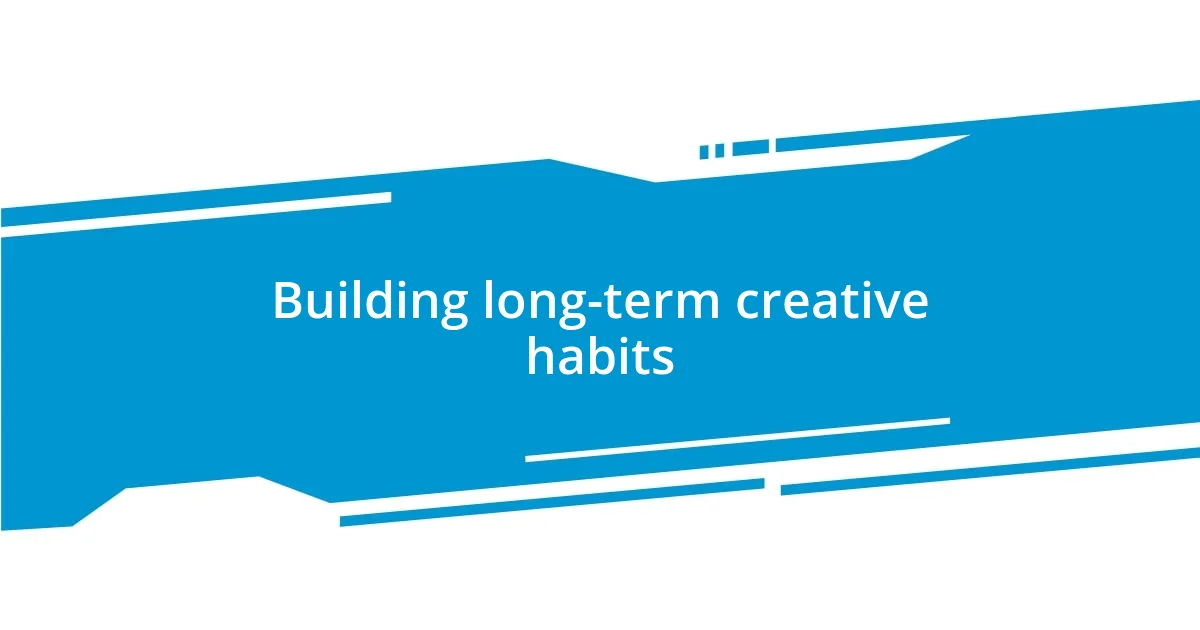
Building long-term creative habits
Building long-term creative habits is essential for maintaining a steady flow of inspiration. I remember the time I dedicated a specific hour each morning just for creative work. At first, it felt uncomfortable, almost like a chore, but over time, it transformed into a sacred routine. Watching the sunrise while jotting down ideas became a daily highlight, a moment I cherished that filled me with energy. Have you ever experienced the magic of establishing a consistent routine?
One impactful method I’ve embraced is creating a “creative accountability” group. A few friends and I started meeting every week to share our progress and brainstorm ideas. It felt remarkably freeing to know I wasn’t alone in my creative struggles. Their feedback often brought fresh perspectives, prompting me to explore directions I hadn’t considered before. Have you found a community that inspires you? It’s amazing how collaboration can fuel creativity!
Lastly, I’ve learned the value of embracing experimentation without fear of failure. A few months ago, I tried combining my painting and poetry skills in a single project. Initially, it felt awkward, like I was stepping outside my comfort zone. But diving into that blend uncovered a new form of expression that I never anticipated. It’s exciting to reflect on how trying something unfamiliar can open doors to unexplored avenues. What could you create if you allowed yourself to experiment?
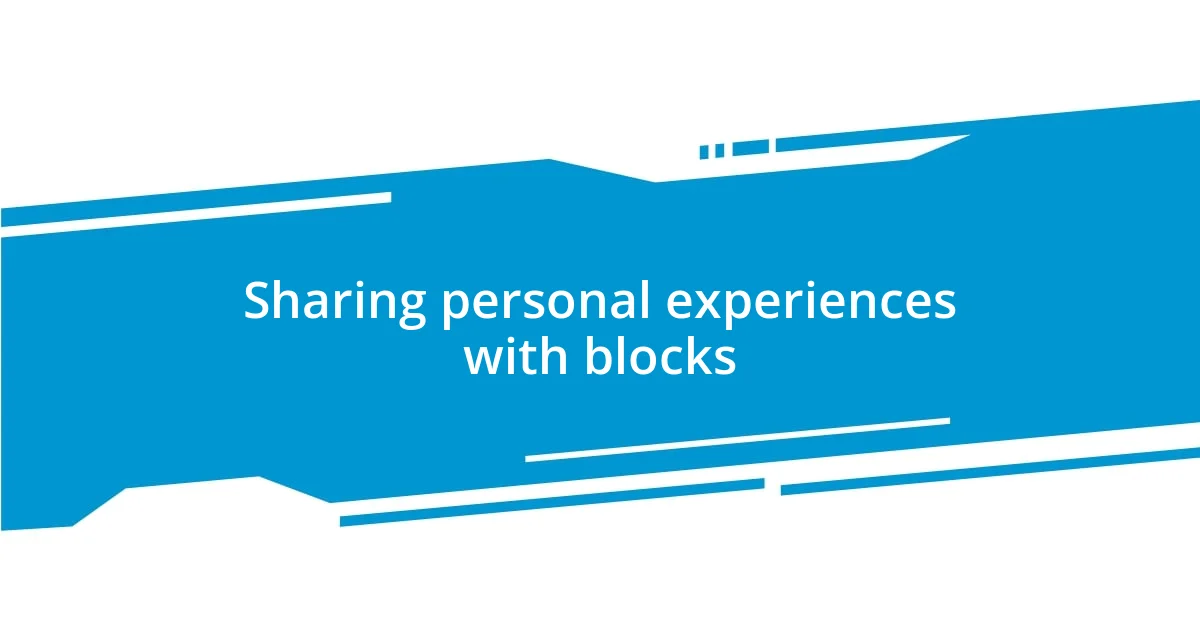
Sharing personal experiences with blocks
Creative blocks have a way of creeping into our lives, often when we least expect them. I recall a time when I was supposed to write a piece for a publication, but the words just wouldn’t come. Frustration settled in, and I felt like I was staring at a blank page forever. In that moment, I decided to temporarily step away and spent an evening cooking my favorite recipe. As I mixed the ingredients together and savored the delicious smells wafting through my kitchen, I found not only comfort but also a newfound clarity that led me back to my writing with fresh energy. Have you ever noticed how shifting your focus can sometimes unlock creativity?
Sometimes, I find it helpful to share my struggles with those closest to me. I remember a particularly rough patch where I felt totally stuck. Instead of isolating myself, I reached out to a dear friend. As we chatted over coffee, simply expressing my frustrations lifted a weight off my shoulders. It reminded me that creative blocks are often universal experiences, and discussing them can be a bonding moment. Have you ever poured your heart out to someone and found that it alleviated your creative burden?
Reflecting on my own journey, I’ve realized that creative blocks often come wrapped in fear—fear of imperfection, of disappointing others, or even of failing to meet my own expectations. A while back, I participated in a local art fair, despite my lingering doubt about my work’s worth. To my surprise, opening up that part of myself to the outside world was liberating. I felt a rush of vulnerability combined with exhilaration that spurred new ideas and ignited a passion within me. Have you ever confronted your fears head-on? Embracing that discomfort can truly pave the way for breakthroughs.

